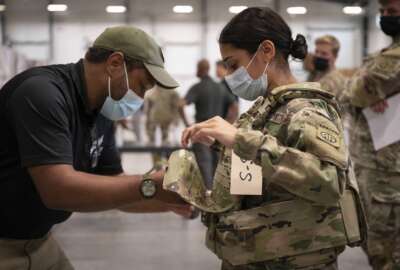What to do about obesity among military service members
Obesity is worsening as a military recruitment and readiness problem. Too many potential enlistees arrive at recruitment stations too fat. More than two thirds of...
Obesity is worsening as a military recruitment and readiness problem. Too many potential enlistees arrive at recruitment stations too fat. More than two thirds of active duty service members carry too much weight. The Federal Drive with Tom Temin talked with someone who has studied this problem extensively, and has some recommendations for improving it: National Security Research Fellow at the American Security Project, Courtney Manning.
Interview Transcript:
Tom Temin Briefly, how did you get into studying this particular issue, of all things?
Courtney Manning So I actually started my career as a nutritionist and consultant for the California and New York Public Health System as the educational contributor to a lot of different projects that evaluate school foods. So started kind of in reducing obesity for public schools, then eventually decided I needed to take on some harder problems, as hard as that already is and start working in national security. So this has been a really exciting project that gets to blend a couple of my interests.
Tom Temin Interesting. Yes, because I guess if people are getting to be too much weight carrying as children, they’re going to carry that to the point of life where they might be potential enlistees and then the military has a problem here. So give us the scope of the problem. And how did you come up with the numbers?
Courtney Manning The finding of the numbers is the most interesting part to me as a data analyst. I think that starting out with solid numbers and tracking of this problem is key to finding solutions to solving it. Right? And that’s our also biggest problem with this research is that since 2017, the U.S. military has not reliably tracked obesity rates simply because not as many individuals who are a BMI plus 25, which is the signifying code for overweight or BMI plus 30, which.
Tom Temin BMI is Body mass index.
Courtney Manning Body mass index. Correct. Are, you know, 30 and above. Of course, the way that doctors in clinical settings diagnose obesity is that BMI of 30 in association with a number of different health symptoms. And that BMI of 30 is a level of over fat in the body that you really want to start evaluating for other health concerns, like pulmonary embolisms, for example, strokes, heart attacks, all things that would be disastrous in active duty.
Tom Temin Right. You came up with a number of 68% of active duty service members have overweight or obesity. That’s two thirds.
Courtney Manning Yeah, it’s a significant problem. And the way that the military itself identifies overweight and obesity is a little bit different. They seem to have a unique way of presenting an overweight applicant somewhere between the scale of 26 and 29 to give an extra generous allotment of body fat so that if you are someone who is incredibly fit, highly muscular, you won’t necessarily be pegged as an overweight troop right away. So they have already been quite generous with their definition of these terms. But as far as our research is concerned, we’re looking at those BMI values that the international community and doctors and health care professionals use.
Tom Temin Sure. And you can carry a little extra weight and be highly fit. And you can also be skinny as a rail and not be fit. So it’s not necessarily a 1 to 1 problem, correct? I mean, fitness is what matters. And in military setting, I imagine endurance.
Courtney Manning Oh, absolutely. And tests have been conducted extensively by the Department of Defense that demonstrate that people with a little extra weight, they can oftentimes lift and load bear. You know, we’re thinking guys with 300lb packs pretty easily, whereas unfortunately, the detriments of excess fat in the body, they over weigh the minor advantages in those specific settings for those individuals. So a lot of people who are highly fit the kind of guys that you’re probably thinking of when you’re thinking of the active duty service, they could also be carrying excess fat because having fat in your body doesn’t preclude the development of muscle, right? So you can have both. And it’s interesting because when we do evaluate these troops in these super sophisticated body scanners that cost like 30 to $100000 each, we’re finding that those bodybuilder type guys, they’re really, really fit and they have excess fat and that excess fat is causing them to have heart problems earlier in life, increased muscle strains and injuries out of breath, shortness of breath, and that could be disastrous in a battlefield setting.
Tom Temin What you really want is high VO2 max. That is the ability to process oxygen.
Courtney Manning Exactly. And that can be like severely limited in a setting where you are under very little sleep, right under extraordinary stress, which if we were to, God forbid, have some sort of full ground scale engagement abroad, we would want our troops to have that VO2 we would want to have that guys who can not only just lift something for a couple of seconds and then put it down, right, but to carry things long distance and hopefully not have to be carried from the battlefield.
Tom Temin So the body mass index, the obesity question exists in the larger context of what constitutes proper fitness for military work.
Courtney Manning Oh, absolutely. And the Department of Defense has all the resources and they have all of the authority and power both to collect this data, and to implement change. So what we’ve noticed is that over the past few decades, as obesity has become an enormous problem, what we’re seeing is not an increase in transparency and an increase in reporting of these numbers. We’re actually seeing a decline. And that, especially since 2017, has become an enormous problem, because when only about 7-30% of individuals who have that obese BMI. Right. Are actually being diagnosed with obesity, and then even fewer of them are receiving treatment. We’re facing a problem where if you’re just looking at obesity rates, you don’t understand how big the problem is. You really have to look at those BMI rates. And those BMI rates are the ones that are being removed from all of these military reports that get sent to DOD stakeholders in Congress.
Tom Temin We’re speaking with Courtney Manning. She’s national security research fellow at the American Security Project and is the reason they’re not collecting that data as they don’t want to hurt people’s feelings that they’re big or what is it?
Courtney Manning So I’m not normally one to decry wokeism or to, you know, really take a stand on that specific issue. But in this case, there is significantly and increasingly a desire on behalf of commanders and military leaders to be more sensitive on the topic of obesity. And this has led to we were talking earlier about kind of terminology and how to ensure that we’re using correct terminology when referring to this problem. If people have obesity, that is a chronic disease and they need to receive treatment for it just because of the high correlation of that BMI over 30 with associated health conditions and co-morbidities. Right. But if you’re telling guys, well, you’re just a little big, right? You’re not fat and you’re having commanders who are responsible for referring these overweight military members to a doctor, they can decide on their own. I don’t want to have this difficult conversation. I don’t want to tell my guys who are already under a lot of pressure to perform and I’m already under a lot of pressure to retain right troops in my unit. I might just not send them in for evaluation. I might think to myself, they look fine, they’re lifting fine. That is not a good way to determine who is physically fit enough to be deployed.
Tom Temin So you have a long list of recommendations then not so much on how to get people to lose weight, but on how the military can get a handle on the issue.
Courtney Manning Yes, it’s pretty solid. The science behind what helps people lose weight. And just recently, we’ve had an influx of really remarkable medical treatments that can help people lose weight. You know, Wegovy, Ozempic, some of these other ones that can really make a difference in these guys. But if they’re not being diagnosed, if a doctor is never seeing them at any point, Right. For obesity, they’re never going to get the medical treatment that they need to lose weight. And that’s where the problem starts.
Tom Temin So you’re saying the Defense Health Agency should promote and enforce awareness, diagnosis and treatment of obesity as a chronic disease?
Courtney Manning Right. Because right now, let’s say you go through a fitness test, right? Your commander is watching you run laps around the track. They are taking a note of your weight and height at that test. And what that information goes to right now is to an administrative authority that determines whether that individual for one could be separated from service. Right. But of course, there are a few intermediary steps. They are given a test of physical fitness. And if they score 285 and above, regardless of how heavy they are, they can get an exemption. Right then it’s about, well, are they even a little overweight? Maybe we’ll make an allowance and then it’s up to commander discretion. And at that point, the commander can think I can fill out all this administrative paperwork to judge this person is too fat to serve. Or I cannot, right. Just let them go back in. My life is easy. Their life is easy. My retention numbers are good. They are good to serve. And if I decide that they are not fit to serve, they face administrative sanction. So they can’t go to advanced training opportunities, they can’t get promoted, they can’t have a variety of other privileges, and they’re taken out of service and put into kind of this military fat camp. Right. Which is very stigmatizing for service members. They basically feel like they’re being removed from their peer organization, they’re removed from their opportunities, and then they could be separated if they don’t improve by six months, which is in a state right now where we’re having this recruitment and retention crisis. We can’t afford.
Tom Temin That. All right. And what other recommendations do you have besides DHA treating this in that certain manner? But basically confronted by measuring everyone and then if they reach that level that is considered obese in body mass index, count them as such and then get them into counseling.
Courtney Manning Absolutely. And there are specific counselors who are like the best at this. Right. You would think, oh, just because they’re a doctor, they obviously know what to do. But we find this across the board, not just in the military, to be untrue. So military members are going to doctors and if they don’t meet pre-diabetes screening criteria, which over 50% of them do. Right. But let’s say they don’t they might not be diagnosed with obesity even if they have an adipose tissue dysfunction or other like direct symptom of obesity in their body right now. And that’s a problem because if you’re treating this problem as one that is administrative or you’re disregarding BMI and you’re just looking for pre-diabetes or diabetes indicators. You’re missing out on a lot of health conditions that could affect service members. And then those might not show up until you have a stroke. Right. Or a heart attack in the middle of Kuwait or Iraq. Sure. You know, and that’s a problem.
Tom Temin So basically, get rid of the fat shaming and stigma of it. Get people objectively measured and then get them treatment for whatever it is that’s causing the obesity. It could be an eating disorder. Sometimes it’s a psychological component or sometimes, you know, it’s three desserts and just take one.
Courtney Manning Exactly. And you make it sound simple because it should be simple, right? That’s exactly how it should be. If you have that BMI of over 30, the correlated health conditions are so severe in the body that you really need to get checked out. And we’ve heard from people from all sorts of the spectrum politically saying, well, there are certain cultural problems with BMI. And the American Medical Association has actually come out and said that the BMI system is racist. Right. Simply because not every person from every background stores fat in the same way. And not all of those things can contribute to the same exact health problems in the same populations.
Copyright © 2025 Federal News Network. All rights reserved. This website is not intended for users located within the European Economic Area.
Tom Temin is host of the Federal Drive and has been providing insight on federal technology and management issues for more than 30 years.
Follow @tteminWFED







